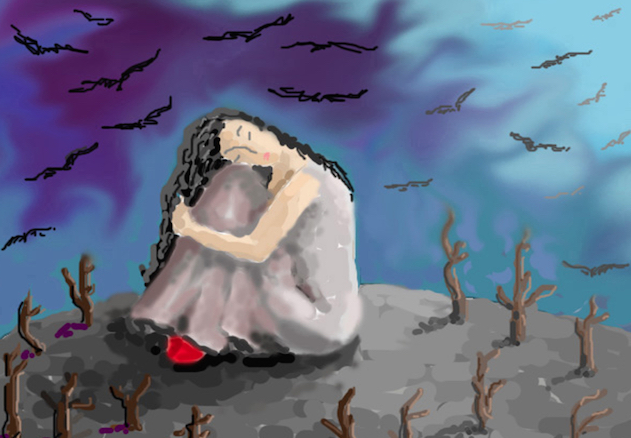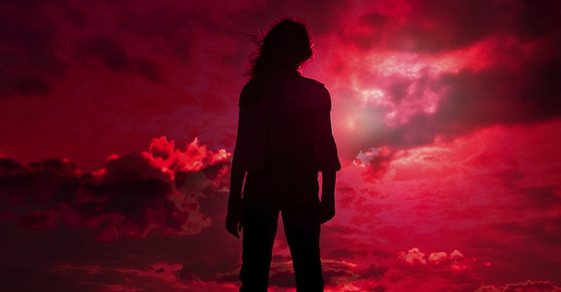“Vulnerability is about showing up and being seen. It’s tough to do that when we’re terrified about what people might see or think.”
— Brené Brown

As I was sitting down to write this article, I thought of a few topics: ‘Gratitude for Thanksgiving’ and ‘Joy for Christmas’ and ‘Happiness for the Holidays’ – but what I was honestly thinking is: “What the hell do you have to say that is special Patti? It’s all been said before and you are not adding anything special to this world!” I froze. So I decided to just look at Facebook on my phone instead of write . . . which of course made me feel worse – because on FB most people look like they have everything under control . . .
I started wondering where these insecurities came from. My first thought was my mother, a painfully depressed alcoholic. But to be fair, she loved me and encouraged me when I was young. Then I thought about my dad, a ping pong ball of rage and Peter Pan ‘never grow up’ energy; but actually much of the time, he encouraged me to be audacious and live big.
Yes, both my parents did add to this negative messaging that I still carry, but it is absolutely added to and encouraged by our culture. We are so scared of getting cut down if we stand out, or trolled if we are seen saying much of anything online. Perhaps, as Marianne Williamson so eloquently puts it, my deepest fear is my own power.
“Our deepest fear is not that we are inadequate. Our deepest fear is that we are powerful beyond measure. It is our light, not our darkness that most frightens us. We ask ourselves, Who am I to be brilliant, gorgeous, talented, fabulous? Actually, who are you not to be? You are a child of God. Your playing small does not serve the world. There is nothing enlightened about shrinking so that other people won’t feel insecure around you. We are all meant to shine, as children do. We were born to make manifest the glory of God that is within us. It’s not just in some of us; it’s in everyone. And as we let our own light shine, we unconsciously give other people permission to do the same. As we are liberated from our own fear, our presence automatically liberates others.”
*Please note, that feels rather cringe-worthy to say that I am afraid of my own power. My head is making serious fun of me at the moment . . . But I persist . . .
I have pursued a career of being vulnerable in front of others. I write blog posts and articles that people can read and comment on; I’ve written a book that is subject to people reviewing and saying mean things about; I put myself out there vulnerably. And it just so happens that a new study suggests that we judge ourselves more harshly than others do when we put ourselves out there, so maybe there is validity in my fear.
Professor and author Brené Brown has studied and written about vulnerability in depth:
“We love seeing raw truth and openness in other people, but we are afraid to let them see it in us,” she writes. “Vulnerability is courage in you and inadequacy in me.”
In a recent Greater Good article, this phenomenon was explored:
“Participants in a study imagined either themselves or someone else in different vulnerable situations: confessing romantic feelings for a best friend, admitting a costly mistake at work, asking for help from a former boss, or baring their imperfect bodies at a swimming pool. Then, they rated how vulnerable the situation was, and how they evaluated that vulnerability—as an act of strength or weakness, something desirable or something to be avoided … And as Brown had predicted, the participants interpreted that vulnerability differently: They saw it in a more positive light when someone else was going out on a limb rather than themselves.”
They describe Vulnerability as being a “beautiful mess.” Indeed vulnerability comes with some risks, we may be laughed at, made fun of and trolled; but there are rewards as well: We may inspire someone and touch someone’s heart, and ultimately find a beautiful sense of belonging. The research suggests that we may be overestimating the risks and underestimating the benefits.
“Showing vulnerability might sometimes feel more like weakness from the inside…[but] to others, these acts might look more like courage from the outside,” the researchers write. “It might, indeed, be beneficial to try to overcome one’s fears and to choose to see the beauty in the mess of vulnerable situations.”

One article suggests 7 benefits of vulnerability:
1. You may learn to appreciate the quirks that make you unique.
Being vulnerable may help you embrace all of you, all the things that make you special.
2. You may make peace with troubling memories from your past.
Being vulnerable may help you get rid of some pent-up baggage that bothers you. While it isn’t easy to deal with painful memories, it is better to confront your past than it is to hide from it.
3. You may attract the right kind of people into your life.
Being vulnerable may help you understand what types of people you can most relate to and which ones to avoid.
4. You may find it easier to empathize with the struggles of others.
Being vulnerable can help you develop empathy for others.
5. You might earn the trust of people at work.
Being vulnerable might help you grow closer to the people in your workplace.
6. You may strengthen your bond with your romantic partner.
Being vulnerable will probably help you bond with the person you love most.
7. You will humanize yourself in the eyes of others.
Being vulnerable will help you demonstrate that you are an approachable person. While it isn’t easy to find the courage to reveal our true nature, there is no better way be seen as human and open.
So as I sit down to write this article and hope that no one rolls their eyes at me and tells me that the world would be a better place if I would just shut up, I remind myself of Brené Brown’s words:
“Vulnerability is the birthplace of love, belonging, joy, courage, empathy, accountability, and authenticity. If we want greater clarity in our purpose or deeper and more meaningful spiritual lives, vulnerability is the path.”

